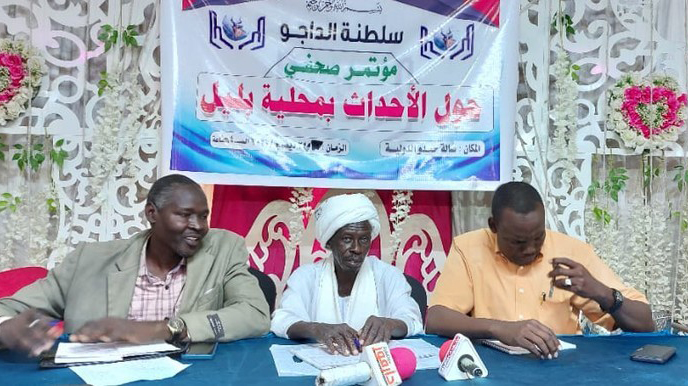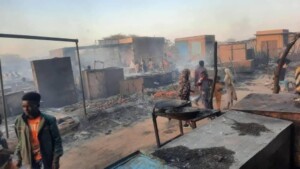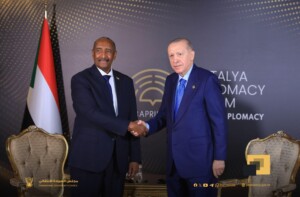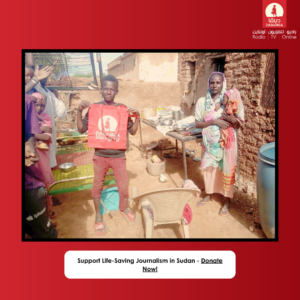Over 16,000 displaced following attacks by gunmen in South Darfur

Sultanate of Daju hold a press conference in Nyala on December 27 )Photo: Supplied)
The United Nations reported that more than 16,000 people have been displaced because of attacks on villages of Beleil in South Darfur last week, amidst strong condemnation of violence in the region.
Radio Dabanga reported that the death toll from attacks on villages in Beleil, South Darfur, reached at least 15 on Monday, however, there are conflicting reports about the number of victims.
The Sudanese Central Committee of Doctors reported that nine people were killed and 18 others were injured during the attacks last week. Six of the victims were killed by bullets, one by immolation, and two were hit in the head with a blunt object. 15 people were injured by bullets, two by fire, and one has a critical injury after being hit in the head.
The UN Office for the Coordination of Humanitarian Aid (OCHA) in Sudan reported on Monday that people took refuge in Dereig camp for the displaced in Nyala locality, the Beleil camp in Beleil locality, and the Damma camp for the displaced in Mershing locality. Others fled to villages in Nitega locality.
A delegation from various UN agencies and international and national organisations visited the displaced on Monday to assess their needs. Osman Ibrahim, representative of the Sudanese Humanitarian Aid Commissioner confirmed in a press statement following the visits the dire conditions the people are living in, after losing their property and food stocks when their houses were burned down.
People who fled strongly criticised the slowness of the authorities of Beleil locality and the South Darfur government in dealing with the recent violence, calling on the governor to listen to them directly.
Some of the displaced expressed their desire to return to their villages but said they fear that the violence may erupt again. They called for more presence of security forces and the removal of “the outlaws” from their farms “once and for all.”
‘Deliberate and systematic’
Daju tribe leader Saleh Eisa said that “the security situation has not improved,” even after a joint force of army soldiers, Rapid Support Forces (RSF) paramilitaries, policemen, and members of the General Intelligence Service (GIS) arrived at the affected areas on Sunday. He told Radio Dabanga that a vehicle carrying food and other relief items for the victims was set on fire on Monday.
Roads between the affected villages and the camps of Kalma, Dereig, and Otash have partially opened, Eisa said. He reported that there is a lack of food, and “shelter and blankets are needed during the bitter cold.”
He demanded that all roads and passages are opened safely, enabling the displaced to reach their families, and the prompt provision of shelter materials, food, drink, clothing, and blankets.
The Daju sultanate described the attacks on the local villages of Beleil in the state of South Darfur as “organised.” It amounts to “ethnic cleansing,” he said.
The National Authority for the Protection of Civilians described the attack on the villages in Beleil as “deliberate and systematic.” In a statement this week, it expressed its deep concern over “the repeated barbaric aggressive acts against innocent citizens in villages of Beleil.”
Five days after the first attack on the villages in Beleil, the Darfur Regional Government, chaired by former rebel leader Minni Minawi, issued a statement in which it expressed “its total rejection of the way the parties dealt with the problem,” and condemned “the tendency of the components of society to solve their problems through armed conflicts.”
The DRG announced that it will work with the state government to hold those involved to account in a fair trial.
Causes of violence
The statement referred to the region’s security and developmental woes due to the failure of the transitional period. Failure to implement the Juba Peace Agreement, further security arrangements, Darfur Regional Governance Law, and payments to the region which would help it to develop have led to this situation, according to the DRG.
Yesterday, members of the Sultanate of Daju said in a press conference in Nyala that the attacks were carried out by people wearing RSF uniforms. They were reportedly riding in RSF four-wheel drive vehicles, and on motorcycles and camels.
The speakers said that what happened was not a tribal conflict, but an attack on innocent defenceless people by gunmen. They warned that the violence will continue even after the declaration of the state of emergency, which was put in place by the South Darfur authorities on Saturday.
The aftermath of the attacks will cost approximately SDG 130 million according to the speakers, who hold the government responsible for what happened. They urged for the dismissal of acting governor of South Darfur, Hamid El Tijani, as well as an urgent international investigation.
They claimed that the attacks on the villages in the Moreer Administrative Unit aim to displace the indigenous population, and said that the areas between Andar to Damma and Moreer and Um Zeifa have become settlements for new population groups.
They pointed to several attacks in the area in November and the release of livestock on farms without any accountability or security measures taken. They said that the idea of conflict between herders and farmers has become a peg on which all security failures are hung.
The Darfur Regional Government (DRG) said in a statement that “the tendency of the components of society to solve their problems through armed conflicts is unacceptable.”
Condemnation of the attack
Political parties and other rebel movements called for an investigation into the violence and the arrest of those involved.
The Sudanese Congress Party and the National Umma Party both condemned the events in a statement and “hold the putschists fully responsible for the events.”
The Justice and Equality Movement, the Sudan Liberation Movement-Transitional Council faction, the Sudan Liberation Forces, and the Sudan People’s Liberation Movement-North under the leadership of Malik Agar, each called for an immediate investigation, arrest and trial of the perpetrators, and disarmament.
The mainstream Sudan Liberation Movement headed by Abdelwahid El Nur “holds the coup government and its militias fully responsible for these terrible crimes.” The movement condemned “the silence of the international community regarding the ongoing crimes and violations and its failure to protect defenceless civilians.”
UNITAMS strongly condemned the recent violence in South Darfur, calling on the parties to the conflict to stop the violence immediately. In a statement yesterday, UNITAMS called on the authorities to take stronger measures to protect civilians, allow humanitarian access, and hold perpetrators accountable. The mission also emphasised the urgent need to comprehensively address the root causes of violence across Sudan.
On December 14, Radio Dabanga reported a number of attacks on civilians by armed men in Darfur. “A new wave of attacks on civilians in Darfur since mid-November 2021 highlights the urgent need for the UN to enhance its scrutiny of the restive region of Sudan,” said Human Rights Watch in a statement the day after.











 and then
and then